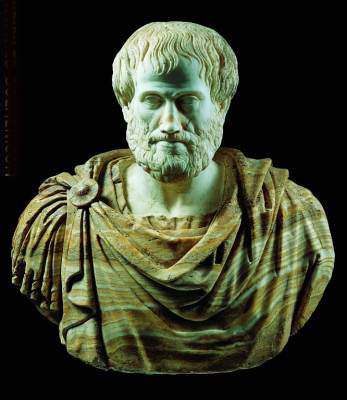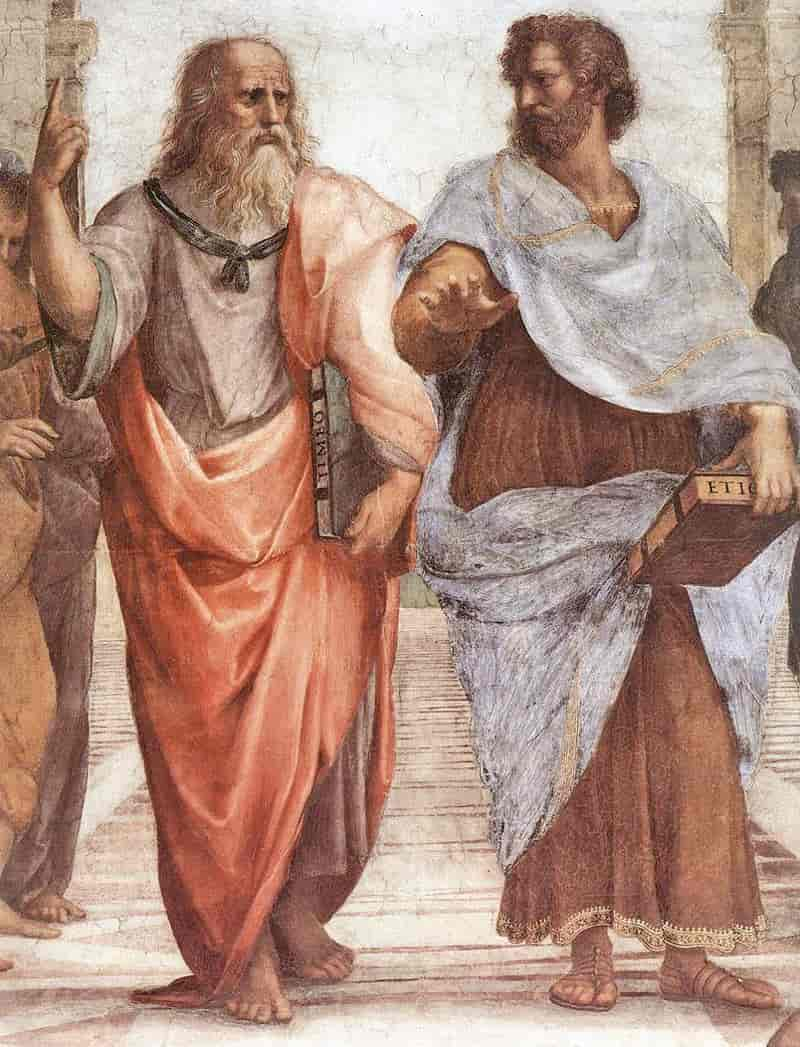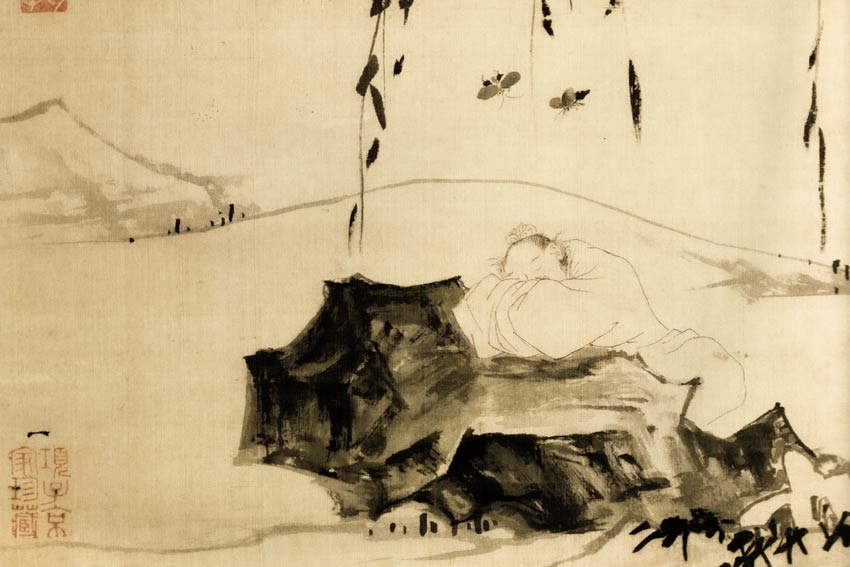In China, the existence of Aristotle is questioned

A Chinese "intellectual" has made claims on social media that would merit a declaration of war from Greece on China. Did Aristotle really exist? The provocative question, which was the subject of a viral video by Chinese nationalist scholar Jin Canrong, launched yet another battle in the narrative war between China and the West.
Jin is not a historian but a leading expert on China-US relations at Beijing's Renmin University and an advisor to the Chinese government. He is also an influencer on Douyin, the Chinese version of TikTok, where last month a video clip of his talk on Aristotle went viral, generating a tsunami of public debate about the reliability of Western history.
Jin argues that there is no written documentation before the 13th century that can prove the existence of Aristotle and that the ancient philosopher, if he had existed more than 2,000 years ago, could not have written hundreds of books containing millions of words before arrival of paper in Europe. in the 11th century.
“Aristotle just appeared, and what made him most suspicious is that he seems to have an all-encompassing body of knowledge, ranging from optics and ethics to economics and politics,” he said in the video.
Mainstream historians have criticized Jin's argument as superficial and flawed, pointing out that similar questions could be raised about ancient Chinese philosophers such as Lao Tzu. Indeed, paradoxically, there are many ancient and even contemporary quotes from Aristotle, which cannot be said about many figures in Chinese history.
But Jin's statements reflect a growing trend among some nationalist intellectuals who argue that the world needs a new, less Western-centric version of history as China rises onto the world stage and engages in a "war of narratives." with the United States and its allies and Aristotle is the latest victim of this war.
This struggle would like to lead to a rewriting of global history on a less Western and more Chinese vision, without understanding that one can very well study and appreciate one history without having to humiliate another. In a world that was much larger than the current one, it was possible that philosophical schools coexisted at a great distance, perhaps capturing similar aspects, such as the Greek sophists and the Chinese school of Names. If anything, what differentiated China and the West was the greater Eastern centralization and the Western heterogeneity and fragmentation, which however allowed for greater protection of ideas and writings. An event such as the " Burning of books and burial of scholars " such as that of 213-206 BC in China would have been unthinkable at the level of the entire West and Middle East united and communicating. Not that there was no intolerance in the West, but never spatially with the breadth of the Empire.
“I believe the task of deconstructing that position is still a long and challenging journey, but we have the confidence to continue and do it well,” Zhang said.
Chinese leaders also highlighted the importance of the country's history and culture in the modern era. In June, President Xi Jinping said at a symposium in Beijing that China's unique development path is rooted in the historical continuity of its culture.
China's civilization is "the only uninterrupted one in the world," Xi said, adding that cultural heritage, innovation and development were key factors for China to become a global cultural power.
Ancient Greece is widely considered the cradle of democracy and Western civilization, and Aristotle, born in 384 BC, was one of its most prolific and influential figures. Obviously the very existence and content of Greek civilization becomes an enemy of the Chinese cultural vision.
This polymath has been credited with writing between 400 and 1,000 books ranging from the natural sciences, philosophy, linguistics, economics, politics, psychology and the arts. The philosophical tradition that followed him is believed to have laid the foundation for the development of modern science.
In his viral video, Jin questioned how the works of Aristotle, who is said to have written 3 million words on parchment during his lifetime, could have been recorded on the ancient writing material, as sheepskin was expensive and difficult to access. Frankly, an absurdity that takes into account neither the literature of the time nor the way of working that the Greek philosophers had. Socrates, on his own, did not write a line.
“According to the analysis of some experts, 3 million words mean that even if all the sheepskins produced in 100 years throughout the region – from the Mediterranean, to Europe… to the Black Sea – were donated to Aristotle, the materials would not have been enough,” Jin said. Which experts=
“There is abundant evidence of philosophers engaging with Aristotle's ideas and even citing his texts as earmarked precisely in the third century [BC],” said Jeremy McInerney, professor of classical studies at the University of Pennsylvania.
Regarding Jin's claims regarding Aristotle's preferred writing material, several scholars have argued that he probably did not write on parchment most of the time.
“He would have written on papyrus, the standard platform for Greek writing,” said Paul Kosmin, a professor of ancient history at Harvard University.
Before the invention of paper in China, about 2,200 years ago, the Egyptians mastered the art of creating a paper-like material from the stem of the papyrus plant. Papyrus was the main writing material in ancient Egypt and was also widely used by the Greeks and Romans.
Even if Aristotle had used parchment, it may not have been as expensive as Jin claimed. McInerney said the text on papyrus and parchment could be scraped off, allowing the material to be reused, so its cost was “not as exorbitant as people imagine”.
Jin also expressed skepticism that Aristotle could have written 3 million words, pointing out that some of the oldest classical works of Chinese philosophers contained only thousands of words.
“He wrote too much,” Jin said.
It is unclear how many words Aristotle actually wrote. “A rough estimate is between 1 and 1.2 million words,” said Xu Songyan, director of the Center for Hellenic Studies at Southwest University in Chongqing. Xu added that because Aristotle's works were written in Greek, the word count could not be compared to that of other ancient thinkers who wrote in Chinese.
Furthermore, Aristotle did not complete these works alone. “About 10 people worked for Aristotle and his students helped him write some of his oral discourses,” Xu said. The famous paripatetic school practically worked for him…
“If we doubt that Aristotle wrote as much as he is believed to have written, then we should doubt the veracity of the works of many other authors,” said Eric Brown, associate professor of philosophy at Washington University in St Louis.
“Any skepticism powerful enough to doubt the existence of Aristotle would have to doubt the existence of almost everyone who has been dead for more than a couple of centuries,” Brown said.
“There are reasons to be skeptical about some details of ancient biographical traditions, since writers would embellish the truth to make a better story, but there is no reason to be skeptical about the very existence of the people they are writing about.”
If you question Aristotle, you also question a certain vision of civilization linked to the city and urban life and democracy. A democracy different from ours, much more participatory, even if on a smaller scale, but still dangerously anarchic for a world that has always expressed itself through centralization, whether imperial or single party. So Aristotle must disappear from history and become a legend, like democracy. Europe itself is forgetting Aristotle, loving the autocrats of Brussels.

Thanks to our Telegram channel you can stay updated on the publication of new Economic Scenarios articles.
The article In China the existence of Aristotle is questioned comes from Economic Scenarios .
This is a machine translation of a post published on Scenari Economici at the URL https://scenarieconomici.it/in-cina-si-mette-in-dubbio-lesistenza-di-aristotele/ on Sat, 04 Nov 2023 17:16:11 +0000.


